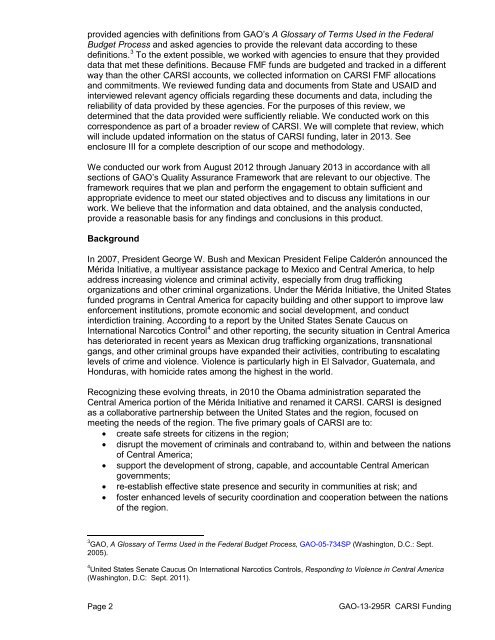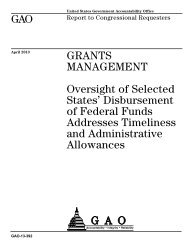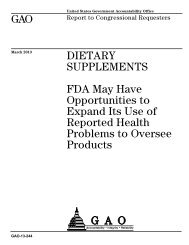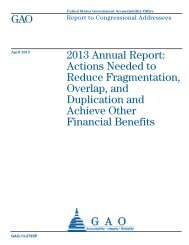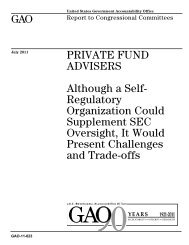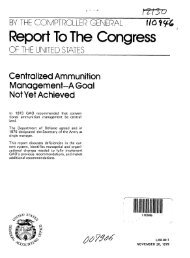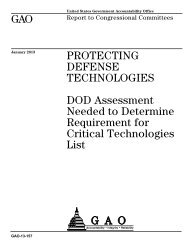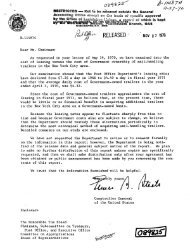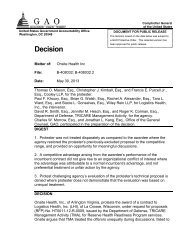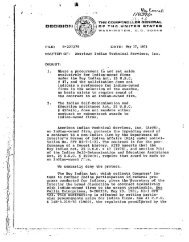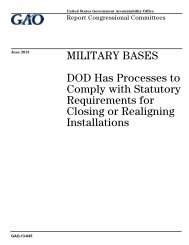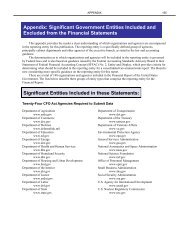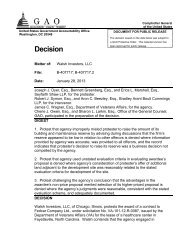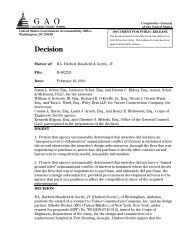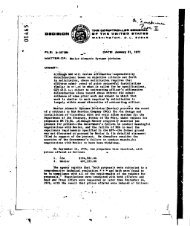Status of Funding for the Central America Regional Security Initiative
Status of Funding for the Central America Regional Security Initiative
Status of Funding for the Central America Regional Security Initiative
Create successful ePaper yourself
Turn your PDF publications into a flip-book with our unique Google optimized e-Paper software.
provided agencies with definitions from GAO’s A Glossary <strong>of</strong> Terms Used in <strong>the</strong> Federal<br />
Budget Process and asked agencies to provide <strong>the</strong> relevant data according to <strong>the</strong>se<br />
definitions. 3 To <strong>the</strong> extent possible, we worked with agencies to ensure that <strong>the</strong>y provided<br />
data that met <strong>the</strong>se definitions. Because FMF funds are budgeted and tracked in a different<br />
way than <strong>the</strong> o<strong>the</strong>r CARSI accounts, we collected in<strong>for</strong>mation on CARSI FMF allocations<br />
and commitments. We reviewed funding data and documents from State and USAID and<br />
interviewed relevant agency <strong>of</strong>ficials regarding <strong>the</strong>se documents and data, including <strong>the</strong><br />
reliability <strong>of</strong> data provided by <strong>the</strong>se agencies. For <strong>the</strong> purposes <strong>of</strong> this review, we<br />
determined that <strong>the</strong> data provided were sufficiently reliable. We conducted work on this<br />
correspondence as part <strong>of</strong> a broader review <strong>of</strong> CARSI. We will complete that review, which<br />
will include updated in<strong>for</strong>mation on <strong>the</strong> status <strong>of</strong> CARSI funding, later in 2013. See<br />
enclosure III <strong>for</strong> a complete description <strong>of</strong> our scope and methodology.<br />
We conducted our work from August 2012 through January 2013 in accordance with all<br />
sections <strong>of</strong> GAO’s Quality Assurance Framework that are relevant to our objective. The<br />
framework requires that we plan and per<strong>for</strong>m <strong>the</strong> engagement to obtain sufficient and<br />
appropriate evidence to meet our stated objectives and to discuss any limitations in our<br />
work. We believe that <strong>the</strong> in<strong>for</strong>mation and data obtained, and <strong>the</strong> analysis conducted,<br />
provide a reasonable basis <strong>for</strong> any findings and conclusions in this product.<br />
Background<br />
In 2007, President George W. Bush and Mexican President Felipe Calderón announced <strong>the</strong><br />
Mérida <strong>Initiative</strong>, a multiyear assistance package to Mexico and <strong>Central</strong> <strong>America</strong>, to help<br />
address increasing violence and criminal activity, especially from drug trafficking<br />
organizations and o<strong>the</strong>r criminal organizations. Under <strong>the</strong> Mérida <strong>Initiative</strong>, <strong>the</strong> United States<br />
funded programs in <strong>Central</strong> <strong>America</strong> <strong>for</strong> capacity building and o<strong>the</strong>r support to improve law<br />
en<strong>for</strong>cement institutions, promote economic and social development, and conduct<br />
interdiction training. According to a report by <strong>the</strong> United States Senate Caucus on<br />
International Narcotics Control 4 and o<strong>the</strong>r reporting, <strong>the</strong> security situation in <strong>Central</strong> <strong>America</strong><br />
has deteriorated in recent years as Mexican drug trafficking organizations, transnational<br />
gangs, and o<strong>the</strong>r criminal groups have expanded <strong>the</strong>ir activities, contributing to escalating<br />
levels <strong>of</strong> crime and violence. Violence is particularly high in El Salvador, Guatemala, and<br />
Honduras, with homicide rates among <strong>the</strong> highest in <strong>the</strong> world.<br />
Recognizing <strong>the</strong>se evolving threats, in 2010 <strong>the</strong> Obama administration separated <strong>the</strong><br />
<strong>Central</strong> <strong>America</strong> portion <strong>of</strong> <strong>the</strong> Mérida <strong>Initiative</strong> and renamed it CARSI. CARSI is designed<br />
as a collaborative partnership between <strong>the</strong> United States and <strong>the</strong> region, focused on<br />
meeting <strong>the</strong> needs <strong>of</strong> <strong>the</strong> region. The five primary goals <strong>of</strong> CARSI are to:<br />
• create safe streets <strong>for</strong> citizens in <strong>the</strong> region;<br />
• disrupt <strong>the</strong> movement <strong>of</strong> criminals and contraband to, within and between <strong>the</strong> nations<br />
<strong>of</strong> <strong>Central</strong> <strong>America</strong>;<br />
• support <strong>the</strong> development <strong>of</strong> strong, capable, and accountable <strong>Central</strong> <strong>America</strong>n<br />
governments;<br />
• re-establish effective state presence and security in communities at risk; and<br />
• foster enhanced levels <strong>of</strong> security coordination and cooperation between <strong>the</strong> nations<br />
<strong>of</strong> <strong>the</strong> region.<br />
3 GAO, A Glossary <strong>of</strong> Terms Used in <strong>the</strong> Federal Budget Process, GAO-05-734SP (Washington, D.C.: Sept.<br />
2005).<br />
4 United States Senate Caucus On International Narcotics Controls, Responding to Violence in <strong>Central</strong> <strong>America</strong><br />
(Washington, D.C: Sept. 2011).<br />
Page 2<br />
GAO-13-295R CARSI <strong>Funding</strong>


